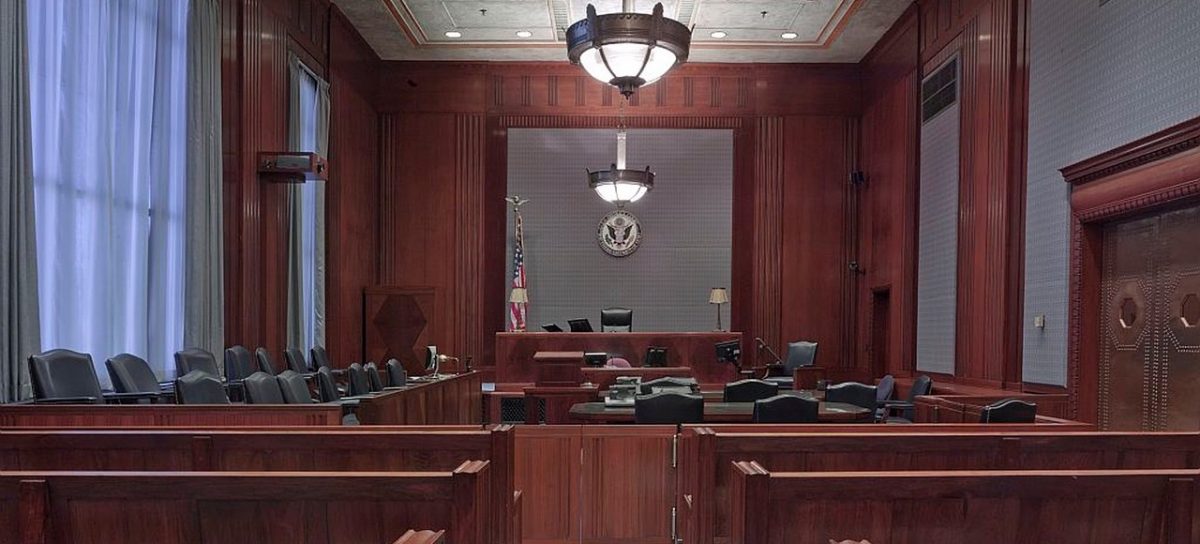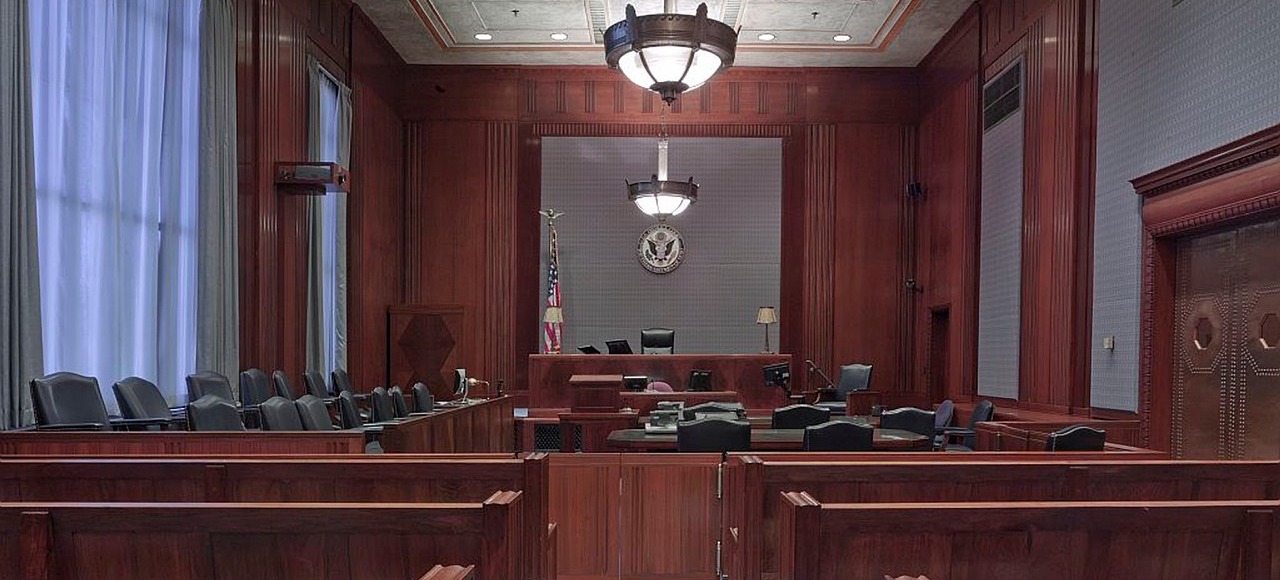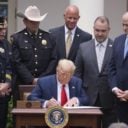

A view of a federal courtroom in Virginia.
I wrote two days ago about a jury correctly voting to acquit a Swiss banker who was being prosecuted (and persecuted) by the government. The jury presumably recognized that it’s not the responsibility of foreign national living in outside the U.S. to enforce our bad tax law.
My support for that jury has nothing to do with my admiration for Switzerland, my support for financial privacy, or my opposition to excessive taxation.
Instead, I was motivated by the principle that borders should limit the power and reach of government. And this principle is a two-way street. I also don’t want foreign governments to have carte blanche to impose their laws inside the United States.
I’m impressed that ordinary jurors apparently understood that principle better than policy makers in Washington.
But that’s not the only evidence for the wisdom of jurors.
Here’s another report on jury nullification in action.
A jury delivered an extraordinary blow to the government in a long-running battle over the use of public lands when it acquitted all seven defendants involved in the armed occupation of a national wildlife refuge in rural southeastern Oregon. …The Portland jury acquitted Bundy, his brother Ryan Bundy and five others of conspiring to impede federal workers from their jobs at the Malheur National Wildlife Refuge, 300 miles southeast of Portland. …Even attorneys for the defendants were surprised by the acquittals. …Federal prosecutors took two weeks to present their case, finishing with a display of more than 30 guns seized after the standoff.
But that was just the start because another trial was scheduled for Nevada.
U.S. District Judge Anna Brown said she could not release Bundy because he still faces charges in Nevada stemming from an armed standoff at his father Cliven Bundy’s ranch two years ago. …Daniel Hill, attorney for Ammon Bundy in the Nevada case, said he believed the acquittal in Oregon bodes well for his client and the other defendants facing felony weapon, conspiracy and other charges.
And what happened at that second trial?
Hold off on that question for a moment, because some of Bundy’s allies were given their day in court. The Las Vegas Sun reported on another outbreak of jury nullification.
A federal jury in Las Vegas refused Tuesday to convict four defendants who were retried on accusations that they threatened and assaulted federal agents by wielding assault weapons in a 2014 confrontation to stop a cattle roundup near the Nevada ranch of states’ rights figure Cliven Bundy. In a stunning setback to federal prosecutors planning to try the Bundy family patriarch and two adult sons later this year, the jury acquitted Ricky Lovelien and Steven Stewart of all 10 charges, and delivered not-guilty findings on most charges against Scott Drexler and Eric Parker. …”Random people off the streets, these jurors, they told the government again that we’re not going to put up with tyranny,” said a John Lamb, a Montana resident who attended almost all the five weeks of trial, which began with jury selection July 10. …The current jury deliberated four full days after more than 20 days of testimony.
So how did the government respond?
The second Bundy trial won’t even take place. As David French explained in a column for National Review, an Obama appointee threw out the case, thus saving a jury from another chance for nullification.
…a federal judge, Obama appointee Gloria Navarro, dismissed the federal government’s criminal case against Bundy and two of his sons on the basis that the government was guilty of “flagrant misconduct” in the trial. Its conduct was so “outrageous” that “no lesser remedy” than dismissal with prejudice “is sufficient.”
And why did the Judge make that decision?
In this case, evidence shows that a federal agency motivated by ego, anger, and prejudice launched the most militaristic and aggressive campaign possible against a rancher whom federal officials had deemed to be likely peaceful. There is evidence they abused that rancher’s son, ringed his property with snipers, and intended to “kick [him] in the mouth and take his cattle.” Then, when it came time to prosecute that same rancher, they withheld the truth and portrayed his accurate claims about federal misconduct as criminal deceptions designed to inflame public outrage. …The judge, however, understood her legal obligations. Who is the greater threat to public peace and the rule of law? A rancher and his sons angry that the government is destroying his livelihood in part through political favoritism and vindictiveness? Or a government that acts as if might makes right, abuses its citizens, and uses maximum force when far less intrusion and risk would accomplish its lawful purposes? Bundy’s case teaches a number of valuable lessons. We cannot presume the government’s virtue. Sometimes even wild tales are true. And every American — from the angriest antifa activist to the leader of “Y’all Qaeda” — is entitled to the full protection of the United States Constitution.
Jim Bovard, in a column for USA Today, opines on the broader implications.
…federal judge Gloria Navarro declared a mistrial in the case against Nevada rancher Cliven Bundy and others after prosecutors were caught withholding massive amounts of evidence undermining federal charges. This is the latest in a long series of federal law enforcement debacles that have spurred vast distrust of Washington. …The Bundys have long claimed the feds were on a vendetta against them, and 3,300 pages of documents the Justice Department wrongfully concealed from their lawyers provides smoking guns that buttress their case. …In the Bundy case, Judge Navarro slammed the FBI for withholding key evidence. …Until the feds cease wrongfully abusing their targets, there will be no rebound in trust in Washington. If the Trump administration cannot rein in renegade federal prosecutors, the president should cease-and-desist any and all claptrap about “draining the swamp.”
In other words, so long as there are some bad apples in the world of law enforcement (and, more broadly, in positions of power in government), jury nullification is a bulwark against abuse by the state.
Incidentally, I’m not implying Bundy and his pals are heroes. Yes, they’ve been mistreated, but they also seem to think they have a right to treat government land as their land. Which is why I think the real solution is privatization of the excessive government holdings of land.
Let’s now zoom out and look at three good pieces about jury nullification in Reason, starting with a column by J.D. Tuccille.
…jury nullification—acquittals of defendants who jurors believe did violate the law but don’t deserve punishment, either because of specifics of the case or because jurors oppose the law in question—isn’t always obvious. …But, as with much of what jurors do, nullification is important and potentially powerful. …Given the fury that judges and other officials display toward independent jurors, including occasional contempt of court and jury tampering charges, …Jurors who go about their business without revealing their motivations are immune to punishment, so keeping your mouth shut is just smart, even if it leaves the rest of us in the dark.
He provides an example of a jury slapping down an absurd prosecution.
…it’s more common to see cases like the rapid acquittal of an Ohio machinist who was arrested for making what Bureau of Alcohol, Tobacco, Firearms, and Explosives agents claimed were firearms noise suppressors (so-called “silencers”) without a license. …He claimed his products were actually unregulated muzzle brakes and that the government’s “expert” had no idea what he was talking about. Whether the jury believed the machinist, or whether they thought it was ridiculous to threaten a man with producing items that can easily be made on a home workbench and that lawmakers at the state and federal level are considering deregulating, is something we’ll probably never know. …Either way, they likely concluded that they were carrying out their responsibility to do justice and protect defendants from government overreach. Because, ultimately, jury nullification is just an extension of the jury’s role as a check on the state—whether prosecutors are applying law badly, or just applying bad law.
It’s not surprising to learn that the government does not like jury nullification.
But what is shocking is that the state is willing to imprison people for exercising their rights to free speech by informing potential jurors about nullification.
Here’s some of what Jacob Sullum wrote.
…a Michigan judge sentenced a local activist to eight weekends in jail, plus $545 in fines, 120 hours of community service, and six months of probation, for passing out jury nullification pamphlets in front of the Mecosta County courthouse. Keith Wood, a former pastor and father of eight, was arrested in November 2015 and convicted last month of jury tampering, a misdemeanor punishable by up to a year in jail. …Wood’s lawyer, David Kallman, who plans to appeal the conviction, argued that distributing the pamphlets, which contained general information about jurors’ rights, was protected by the First Amendment. He emphasized that Wood never discussed Yoder’s case with passers-by at the courthouse. …After Wood’s arrest, Mecosta County Prosecutor Brian Thiede said the FIJA pamphlet is dangerous because “we would have a lawless nation if people were to vote their conscience.”
The last sentence is the key. Notwithstanding the fevered statement of Mr. Thiede, we would not have a “lawless nation.” Jurors have no problem convicting those who assault, harm, kill, steal, and rape.
Nullification is a check on bad laws and/or bad actions by government. And that’s a good thing.
Let’s close with another piece by Tuccille, which has two very encouraging examples. We’ll start in Texas.
…El Paso, Texas, Police Chief Greg Allen turned out to be a surprise defender of bypassing the usual criminal justice rigmarole of booking, mug shots, and jails. While careful to emphasize that he’s no fan of drug legalization, Allen says it’s a waste of his officers’ time to put hours into an “an arrest that has no end result of a conviction because of jury nullification.” This is only the latest evidence that rebellious jurors are putting limits on how badly government officials can treat the rest of us. …”Jury nullification, though still rare, appears to be on the rise in drug cases that reach the trial stage,” wrote Rice University’s Prof. William Martin… But jurors are…doing just that often enough that the El Paso Police Chief sees no point to making arrests that have “no end result of a conviction because of jury nullification.”
And finish with Georgia.
In Laurens County, Antonio Willis faced up to five years in prison for selling the equivalent of a few joints to an undercover cop. The cop, “who switched into an exaggerated Hispanic accent straight out of Cheech and Chong when dealing with suspects,” according to Bill Torpy of the Atlanta Journal-Constitution, kept pestering Willis for drugs while promising to hook the unemployed man up with a construction job. …the jury acquitted after just 18 minutes of deliberations. “A jury in Middle Georgia returned a Not Guilty verdict in a marijuana sale case despite the evidence,” retired sheriff’s deputy Tom McCain, now executive director of Peachtree NORML, approvingly commented after the trial. “The verdict can be nothing other than Jury Nullification.”
The moral of the story is not that jury nullification is a great thing. It’s only a second-best solution to the real problem of bad laws (exacerbated occasionally by bad prosecutors or bad cops).
But so long as bad laws (or incomprehensible laws) exist and government officials sometimes act dishonorably, we should support juries being the last line of defense for persecuted citizens. Remember, a tough-on-crime policy is only good if laws are just.






